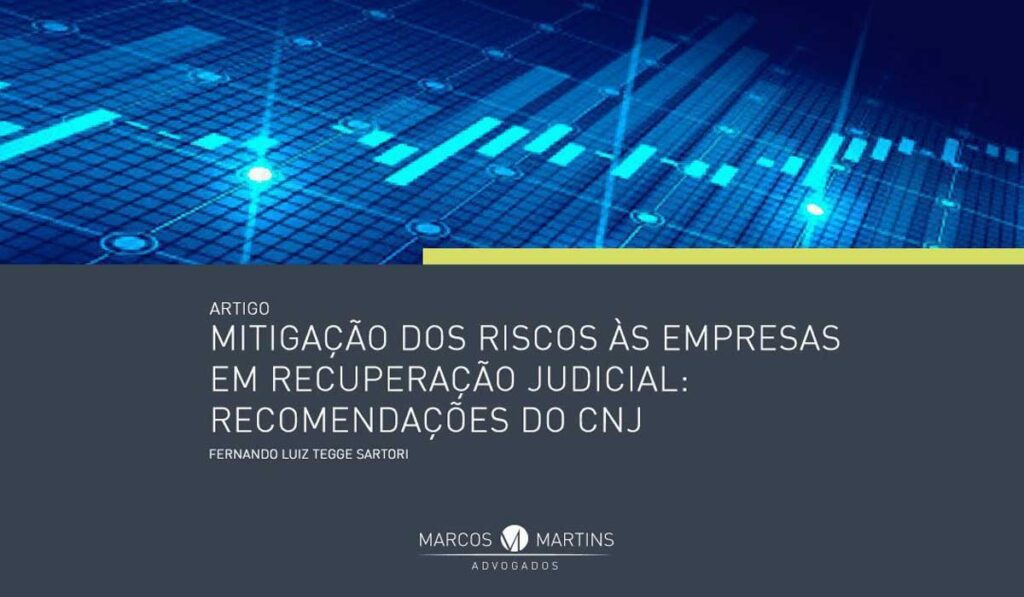Fernando Luiz Tegge Sartori
Lawyer at Marcos Martins Advogados
In view of the undeniable exceptional situation caused by the advent of the new coronavirus (covid-19) in our economy and with the possibility of causing an economic collapse, the National Council of Justice – CNJ issued NORMATIVE ACT – 0002561-26.2020.2.00.0000 (attached), with recommendations to the judiciary to give a unified response to the crisis.
NORMATIVE ACT. RECOMMENDATION. STATE OF PUBLIC CALAMITY. COMBATING THE COVID-19 PANDEMIC CAUSED BY THE NEW CORONAVIRUS SARS-CoV-2. ECONOMIC EFFECTS OF MEASURES TO COMBAT THE DISEASE. BUSINESS RECOVERY PROCESSES. IMPACT ON THE CONTINUITY OF BUSINESS ACTIVITY, GENERATION OF TAXES AND MAINTENANCE OF JOBS. MITIGATING MEASURES. VIGENCY. RECOMMENDATION APPROVED.
In general terms, these are recommendations that prioritize the maintenance of business activity, maintaining jobs and generating taxes for the state, with an emphasis on Judicial Reorganization processes, without prejudice to the use of these regulations as a source of argumentation for similar cases that place the company in a state of risk to its activity.
The aim of the proposed measures, all of which are strictly in line with the legislation in force, is to guide the courts in adopting procedures aimed at speeding up corporate recovery processes and decisions whose primary objective is to maintain business activity, with a direct impact on the circulation of goods, products and services that are essential to the population, preserving jobs and workers’ incomes.
On this point, it should be noted that the rule is in line with the spirit of the reorganization legislation, seeking to achieve the main objective of the LRF, set out in art. 47[1], which is the maintenance of business activity.
In summary, the following recommendations were approved:
- Requests to withdraw amounts deposited in court for the benefit of creditors or debtors must be judged with priority (art. 1 of the normative act);
- Creditors’ meetings that are held in person should be suspended; however, once the urgency of holding the General Meeting of Creditors has been verified in order to maintain the debtor’s business activities and to initiate the necessary payments to creditors, it is recommended that the courts authorize the holding of a virtual General Meeting of Creditors (art. 2 of the normative act);
- In judicial reorganization proceedings, the stay period established in Article 6 of Law 11.101/2005 must be extended in cases where there is a need to postpone the General Meeting of Creditors and until such time as it is possible to decide whether or not to ratify the result of said General Meeting of Creditors (Article 3 of the normative act);
- The presentation of a new judicial reorganization plan should be authorized for companies whose payment proposal has already been approved and which are in the process of complying with the plan (art. 4 of the normative act);
- In cases of non-compliance with the Judicial Reorganization Plan due to the social distancing measures that caused the crisis, non-compliance should be considered a fortuitous event or force majeure, in order to relativize the decree of bankruptcy (sole paragraph of art. 4 of the normative act);
- The continuity of the activities of the Judicial Administrator in a virtual or remote manner must be determined (art. 5 of the normative act);
- Special care must be taken to assess emergency measures, eviction orders for non-payment or executive acts of a patrimonial nature (art. 6 of the normative act).
With regard to the CNJ’s recommendations, all of which are extremely relevant to the current economic crisis scenario, we can see their importance as an emergency remedy for the survival of companies that had been recovering from an economic crisis and were surprised by a global crisis caused by force majeure.
As such, it is essential that courts dealing with judicial reorganization proceedings or executions against companies in a state of crisis analyze requests for compliance with Judicial Reorganization Plans, requests for execution of credit and constriction of assets with the necessary caution, so as not to make it impossible to maintain business activity, even more so at this time of global economic crisis.
On the other hand, it is essential that the respective courts analyze requests for renegotiation of credits by the Recovering Companies in the light of the provisions of article 47 of Law 11.101/2005, as well as requests for extension of the “stay period”, requests for maintenance of essential services in the face of temporary default on contracts, among others that impact on the survival of the company.
Marcos Martins Advogados is always attentive to doctrinal and jurisprudential discussions in order to provide the best possible service to its clients.
[rock-convert-pdf id=”14158″]
[1] Art. 47: The purpose of judicial reorganization is to make it possible to overcome the debtor’s economic and financial crisis, in order to maintain the source of production, the employment of workers and the interests of creditors, thus promoting the preservation of the company, its social function and stimulating economic activity.








